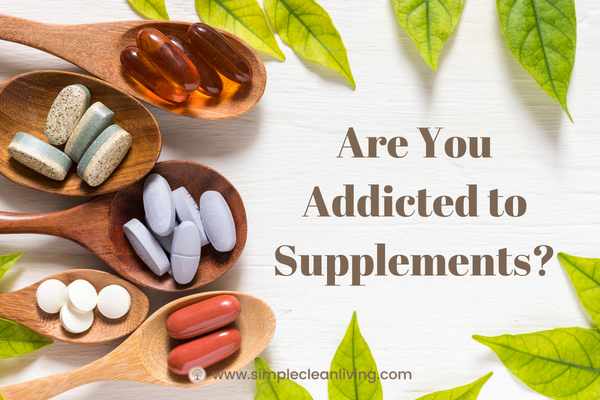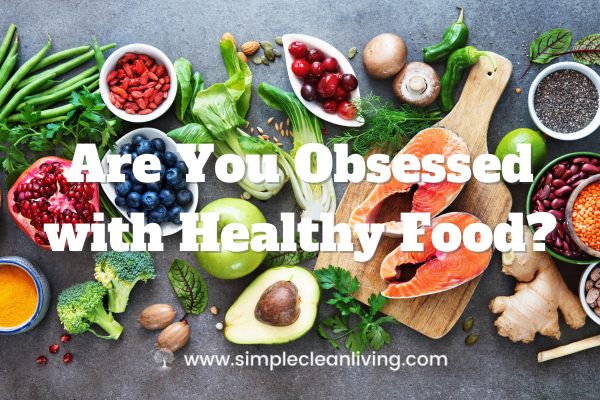Notice: I’m an affiliate for Amazon as well as other companies. Any links in this article may be affiliate links. I always appreciate it if you purchase something using my affiliate links. Doing so helps me to raise a little extra money that pays for the costs of running this site. And it allows me to continue bringing you quality content, all without costing you a thing! Thanks!
Are you addicted to supplements? If you buy the latest, greatest supplement in order to help resolve your symptoms, then you might be. It’s time to stop chasing symptoms and start restoring balance in the body! That will take a different mindset about our health.
I spend a whole lot of time talking to people about healthy foods and natural health in general. And typically in the course of conversation, the subject of supplements comes up. Usually, the person I’m talking with will list a load of different supplements on their daily “health menu”. Or they will want to discuss the latest and greatest vitamin, mineral, or superfood supplement.
And I will admit fully that I used to be big on supplements as well. To the point that I used to have a couple of drawers filled with supplement bottles of all types. I used to read the articles and fall for all of the research on why I just had to try this supplement and why my health would suffer significantly without it.
Do you have drawers or cupboards filled with supplements?
I no longer believe in supplementing like crazy, and there are only a few supplements that I recommend for short-term use…and these supplements actually fill a necessary purpose. But more on that later.
Why you should reconsider supplementing
We were not meant o get our main source of nutrition in supplement form
Our ancestors didn’t supplement. They didn’t have to! They got the nutrients that they needed from the foods that they ate. Period! We are meant to get our vital nutrients from food as well, but with a large percentage of the standard American diet consisting of nutrient-lacking packaged and processed food, we have had to turn to supplements to attempt to nourish our bodies. It is high time, we turned back to food, which contains forms of the nutrients that our bodies can actually more readily use.
Synthetic nutrients
Many of the supplements on the market today are not natural at all….but are synthetic copies of natural vitamins and minerals. Our bodies are simply not meant or designed to utilize those chemical impersonators and so often our bodies just process them right out, without you getting any of the benefits.
Nasty additives
I’ve talked a lot about reading labels, but have you ever actually read the ingredient list for your supplements? There are plenty of supplements that are full of cheap additives and chemical fillers…all things that can cause more problems with your health than not. And some supplements contain additives that are downright dangerous, such as msg and artificial sweeteners that can seriously affect your health.
GMO additives
This one is so big that it deserves its own mention. Many supplements use soy and corn as fillers, both crops which are largely genetically modified in the US. Some supplement companies also use genetically modified microorganisms to produce the products that they sell. This is a very common practice, but unfortunately, more than 15 years after the release of the first GM crop, there still has not been adequate testing done to make sure that genetically modified organisms are safe to consume. Top that with the food companies and biotech companies spending tens of millions of dollars to prevent the labeling of GMO-containing products and it all sounds a little too fishy for me!
Should you be on supplements long-term?
As I said at the beginning of the article, there are only certain times that I recommend supplements for short-term use. I recommend short courses of supplements to heal leaky gut, to overcome mood issues, or for those who are or who have been obese or morbidly obese. These issues often require 1-3 months of supplementation to build up levels and then sustain nutrient levels through the use of food. Most of the time, however, those deficiencies can be corrected with herbs. Herbs are rich in vitamins, minerals, and essential fatty acids. The exception to this is for people who have absorption issues or have supplements that have been recommended by a doctor or practitioner. I’m not talking about the requirements for those people.
There are a few supplements I personally take daily
- Soil-Based Probiotic. Soil-based organisms are a type of probiotic that is much harder than the types of probiotics found in food like yogurt. These bacteria are hardy enough to survive all the way to the small intestine….which is something that doesn’t happen with food-based probiotics. I get that form of probiotics from fermented foods and beverages like kefir, kombucha, kimchee, and fermented vegetables. I feel like we need both types.
- Betaine HCI- I suffered from digestive issues for years and have a very low level of stomach acid from years of taking PPI acid reducers. I will stop taking this supplement once my own natural acid production returns to healthy levels.
I do use Epsom salts and magnesium lotion to keep my magnesium levels up. But I do not take an oral magnesium supplement. Everything else I do with the use of herbs. I use teas and tinctures.
If you are going to continue to use supplements, be sure to purchase whole food supplements without a lot of chemical additives. Read the labels and do some research on any supplements you are considering taking. The best thing that you can do for your health is to be an informed consumer.




